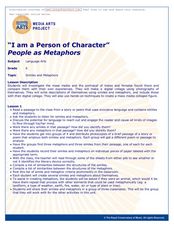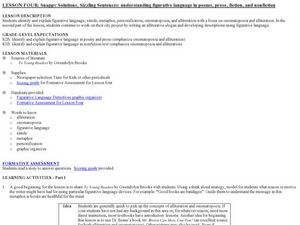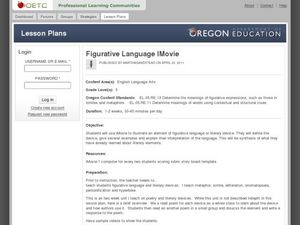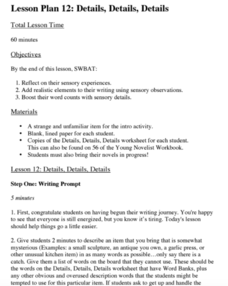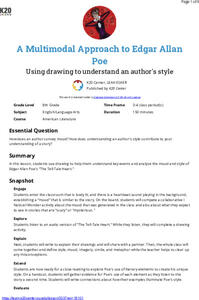EngageNY
Grade 11 ELA Module 2: Unit 1, Lesson 3
Go figure! Scholars examine the figurative language in the last half of W.E.B. Du Bois's work "Of Our Spiritual Strivings." They pay special attention to his metaphors and develop ideas with group discussion and guided questions....
Curated OER
A Simile and Metaphor Lesson
Students use their knowledge of similes and metaphors to analyze poetry. In this poetry and language lesson plan, students read examples of similes and metaphors and write their own examples that describe their city, television, or an...
Curated OER
I Am a Person on Character
Sixth graders explore the portrayal of males and females in mass media. In this language arts lesson, 6th graders create a digital collage and write a description about themselves using similes and metaphors.
Curated OER
Snappy Solutions, Sizzling Sentences
An examination of the figurative language in Gwendolyn Brooks’ To Young Readers challenges your writers to think about the richness of language. Ask your class why Brooks says, “Good books are bandages.” This discussion of alliteration,...
Poetry Society
A Conceit Poem
Young writers needn't be self-involved to craft a conceit. Directions for how to craft this form of extended metaphor, models, and a worksheet are all included in the packet.
Curated OER
Poetry: Simile And Figurative Language
Students explore websites that contain poems about autumn, winter, and the seasonal holidays and explore how similes and figurative language can be used in poetry.
Curated OER
Poetry
What is the difference between a simile and a metaphor? Third graders read a poem as a class and chart all of the similes and metaphors they hear. They then discuss the differences between each literary device as well as what is being...
Curated OER
Poetic Elements Are Fun!
Engage your class in the elements of poetry with a series of lessons and activities. The plans cover simile, metaphor, personification, onomatopoeia, alliteration, and imagery. Learners come up their their own metaphors, identify poetic...
MENSA Education & Research Foundation
Magical Musical Tour: Using Lyrics to Teach Literary Elements
Language arts learners don't need a lecture about poetry; they listen to poetry every day on the radio! Apply skills from literary analysis to famous songs and beautiful lyrics with a lesson about literary devices. As class...
Curated OER
Troublesome Word Rap
Create songs and raps to develop an understanding of the proper use of common misused words and homophones. First, your class defines misused words and homophones correctly by utilizing the words in a rap or song. Then they use poetry...
Curated OER
Simile Stories
Fourth graders view song lyrics and identify similes in the song text. For this similes lesson, 4th graders define and identify similes on a worksheet. Students write their own similes using various adjectives.
Curated OER
Haiku Wrap Up
Students create a haiku about the land formations they've studied. In this haiku lesson, students identify the metaphor and meaning of a given haiku, brainstorm comparisons for a landform photo as a class and choose one to use in a...
Curated OER
Cluing into Symbols Robert Frost
Students use the Internet and video to discover how find evidence in poetry in order to discover the theme(s) of the poems. They are able to define poetic devices like simile, metaphor and repetition. Students identify themes in...
Curated OER
Language Arts: Stylistic Devices
Young scholars are able to define given literary terms, such as metaphor, simile, imagery, personification, symbolism, etc. They are able to identify the use of literary elements in a given text. Students are able to interpret weather...
Curated OER
Figurative Language iMovie
In order to understand figurative language, learners read 5 poems, each exemplifying a different literary device. They discuss and write responses to each poem. They then choose one literary device which they will use as the basis for a...
EngageNY
Mid-Unit Assessment and Discussing Themes in Esperanza Rising: (Chapter 9: "Las Ciruelas/PLums")
Give this skills-based assessment halfway through your unit on Esperanza Rising. After a brief review, class members take the test, which asks them to show that they know how to analyze the novel independently. They are asked to...
EngageNY
Understanding Themes in Esperanza Rising
Determining a theme or central idea is greatly emphasized in the Common Core standards. Target that skill though big metaphors and central symbols in Pam Muñoz Ryan's Esperanza Rising. Help your class reach the standard through...
Curated OER
Similes, Metaphors, and Symbols
Here is an outline of a lesson plan in which learners examine the use of similes, metaphors, and symbols in poetry. They define similes, metaphors, and symbols, complete a handout, and create a poem using types of figurative language.
Curated OER
Fruit Writing
Students who have recently learned about similes and metaphors practice putting them in their writing. They get a better understanding of how similes and metaphors can be used by practicing the usage of them in their own personal...
Curated OER
Details, Details, Details
Writing can become one-dimensional if authors don't involve all their senses. First, scholars observe a strange object which, ideally, they can touch and even smell. Without using certain words (you can create a list or have the class...
Curated OER
Spring Similes
Students write similes with a partner. In this spring similes lesson, students discuss the season an write a story using a minimum number of similes.
K20 LEARN
A Multimodal Approach To Edgar Allan Poe Using Drawing To Understand An Author's Style
True! Poe's "The Tell-Tale Heart" makes readers nervous. But how? Young scholars create a drawing while listening to a reading of Poe's eerie tale to understand how writers create the mood of their stories and what their writing style...
K20 LEARN
My Love Is Like Figurative Language: Figurative Language in Romeo and Juliet
My love is like an anaconda. Huh? Scholars investigate similes, metaphors, hyperbole, and personification used by writers to express feelings. They examine lyrics from songs and lines from Romeo and Juliet and consider how the use of...
Curated OER
Poetic Devices
Introduce middle schoolers to poetic devices with a lesson that asks them to find examples of alliteration, anaphora, onomatopoeia, metaphors, similes, and personification in various poems. Young scholars craft examples of these poetic...
Other popular searches
- Metaphors and Similes
- Poetry Similes and Metaphors
- Similes Metaphors Powerpoint
- Metaphors and Similes Test
- Using Similes and Metaphors
- Autumn Metaphors and Similes
- Similes and Metaphors Poem
- Poetry Similes Metaphors
- Metaphors Similes
- Poems Similes and Metaphors
- Similes Metaphors Idioms
- Similes Metaphors Songs




